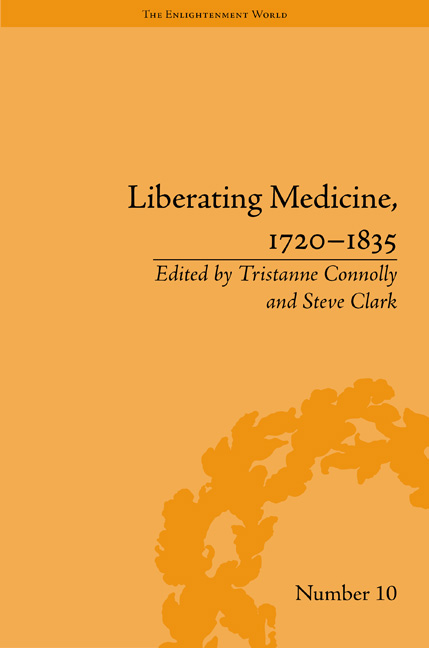Book contents
- Frontmatter
- CONTENTS
- Acknowledgements
- Contributors
- List of Figures
- Introduction
- I Spiritual Sickness and Hypochondria
- II Health and Emancipation
- III Madness
- IV Anatomized and Aestheticized Bodies
- 11 Authority and Imposture: William Godwin and the Animal Magnetists
- 12 George Stubbs's Dissection of the Horse and the Expressiveness of ‘Facsimiles’
- 13 In Submission: Frances Burney's Patient Narrative
- 14 The Surprising Success of Dr Armstrong: Love and Economy in the Eighteenth Century
- V Birth
- Notes
- Works Cited
- Index
14 - The Surprising Success of Dr Armstrong: Love and Economy in the Eighteenth Century
from IV - Anatomized and Aestheticized Bodies
- Frontmatter
- CONTENTS
- Acknowledgements
- Contributors
- List of Figures
- Introduction
- I Spiritual Sickness and Hypochondria
- II Health and Emancipation
- III Madness
- IV Anatomized and Aestheticized Bodies
- 11 Authority and Imposture: William Godwin and the Animal Magnetists
- 12 George Stubbs's Dissection of the Horse and the Expressiveness of ‘Facsimiles’
- 13 In Submission: Frances Burney's Patient Narrative
- 14 The Surprising Success of Dr Armstrong: Love and Economy in the Eighteenth Century
- V Birth
- Notes
- Works Cited
- Index
Summary
John Armstrong's 1736 poem The Oeconomy of Love has recently been characterized as ‘hyperbolic masculinity’, an economy of libertinism that derives from the period's fear of effeminacy. In Conrad Brunstrom's acute commentary Armstrong ineluctably reveals his pressing knowledge of the constructed and vulnerable nature of gendered identity. For this reason, his ‘defense of masculine health emerges essentially as a paranoid effort, and gender evades his every attempt to secure and delimit its scope’. The failure of Armstrong's poem, in this account, is ‘part of a larger repeated failure to discipline the body’. Brunstrom's Armstrong is of a piece with James Sambrook's bluff, masculine failure, a man whose gendered inadequacies undermine his attempts to succeed as doctor and as writer. The surprise, then, is that out of the evident insecurities of The Oeconomy of Love and the 1744 Art of Preserving Health later writers mould a discourse of sexuality as a path to sublimity through the destruction of fixed identities. Just that model of sexuality that Armstrong tries to repress reappears in writing of the Romantic period within a discourse which stresses continuities between gendered identities. Armstrong's failure – if it is that – is the means to create a new economy of love.
The story of failure that Brunstrom and Sambrook tell is one that Armstrong himself sets in motion. In the irritable Medical Essays published in 1773, six years before he died, Armstrong explains his lack of professional success by ‘his having imprudently published a system of what every body allows to be sound Physick – only indeed that it was in verse’. Armstrong identifies the problem as his decision to make explicit that which is common sense (‘what every body allows’) – a shared set of masculine assumptions. He assumes that poetry and medicine are incompatible: writing a poem ‘upon a subject reckoned of no inconsiderable consequence to the health of mankind was, as some say, sufficient alone in this age and meridian, to have ruined him as a Physician’.
- Type
- Chapter
- Information
- Liberating Medicine, 1720–1835 , pp. 193 - 208Publisher: Pickering & ChattoFirst published in: 2014



